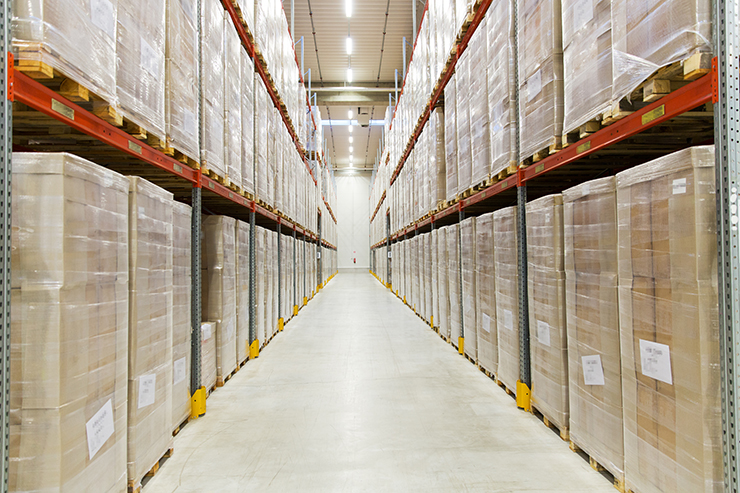"In this current time of crisis, it is arguably more important than ever to look at how supply chains function, and what role maritime trade plays in keeping our world spinning," says Elisabeth Schober. The anthropologist is doing research on shipping and maritime logistics.

Maritime trade: Elisabeth Schober tries to understand the processes behind the supply chains we take for granted. Illustration photo: Colourbox/Syda Productions
In March 2020, a much-awaited large shipment of hand sanitizers bound for Norway was held up in Poland, with authorities there deciding to confiscate the precious cargo in order to incorporate it into their own attempts to protect its population from the ever-spreading coronavirus.
Pictures of countless, neatly packed up boxes full of hand-sanitizer, stacked on top of each other on wooden pallets, which would allow the easy transportation via forklift into shipping containers, made it into the news in Norway.
"These seemingly non-descript photos taken inside a Polish warehouse, signaling an unprecedented stoppage, provide a tiny glimpse into how logistical procedures we used to take for granted have suddenly been thrown into great uncertainty," says Elisabeth Schober.

The Associate Professor at the Department of Social Anthropology currently leads two projects, the Norwegian Research Council-funded Life Cycle of Container Ships and the European Research Council-funded PORTS, which both engage with maritime trade, shipping and logistics from an ethnographic angle.
"Today, most countries in the world find themselves in a similar situation as Norway: we are all highly dependent for our everyday functioning upon the continuous flow of imports, which we now become painfully aware of when it comes to medical supplies," Schober says.
"Finding that some of the things we need for our daily lives may no longer arrive in a store near us with the same precision and inevitability that we are used to, is one of many ways in which we can feel the current crisis directly affect every one of us," she points out.
Overlooked by the Media
No other sector of the world of logistics is as central as that of maritime shipping. An estimated 80-90% of global trade involves shipping via sea. The cargo vessels and their crews sailing the world's oceans, in their attempt to move goods from A to B to C, keep things running for all of us.
Nonetheless, Schober argues that their role has not been receiving much attention in the midst of the COVID19-pandemic.
"Up to 10 000 people are currently stranded at sea on board of cruise ships due to the COVID19-crisis, and we have been flooded with news about the plight of the passengers trapped on these luxurious vessels over the last few weeks," she says.
No estimates have been made as of yet about the number of humans unable to leave cargo vessels.
"Seafarers, mostly hailing from lower-income countries like the Philippines or India, have over recent weeks flooded the NGO 'Human Rights at Sea' with stories about their COVID19-induced difficulties," she says.
The fear of contagion in confined quarters, involuntary extensions of their contracts, and the suspension of shore leave due to ever-changing regulations at the world's ports have taken a heavy toll on the well-being of these cargo-ship crews, according to the anthropologist.
"All the while, port-workers have also been greatly affected by government emergency measures to contain the virus, which has greatly overwhelmed the functioning of some of the globe's ports. These facilities, in essence, are the bottlenecks through which the vast majority of the world's trade has to move, " she says.
Logistical Disarray
Schober points out that during the first stage of the Corona-crisis, countless cargo vessels were laid up in Chinese ports after the temporary closure of factories in China's manufacturing centers.
"While China has in the meantime managed to open up the valve again, with containerized cargo leaving its key ports again at the regular intervals we have come to depend upon, in other places logistical disarray is now only building up. India, for instance, was thrown into much chaos last week, when the lockdown of the country led to an acute shortage in workers at ports," she says.
With many ports in India attempting to invoke "force majeure", which is a clause that allows a party under extraordinary circumstances to fulfil their obligations, the ongoing import and export of commodities into India was suddenly thrown into doubt.
From an Anthropological View
In the meantime UNCTAD, a permanent intergovernmental body established by the United Nations General Assembly, has sought to amplify growing concern within the shipping industry that all governments worldwide need to work harder amidst the crisis to keep maritime trade moving.
Such movement, as UNCTAD Secretary-General Mukhisa Kituyi pointed out, also includes vital medical supplies, which are sorely needed at this time, and items that are necessary for the preservation of many jobs in manufacturing - without which modern society cannot function.
"In this current time of crisis, it is arguably more important than ever to look at how supply chains function, and what role maritime trade plays in keeping our world spinning," Schober says.
Understanding these processes is not simply a matter of studying government policies or statistics of volumes of trade; important as these may be. According to Schober, it is also a matter of understanding the day-to-day lives, the activities, and the motivations of the people who work hard to make keep these supply chains moving, and of the people who rely upon them.
"This is what anthropological studies, at our best, provide: a deeper insight, from the ground up, into how these processes actually operate."






